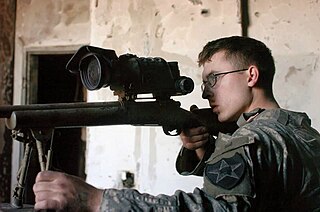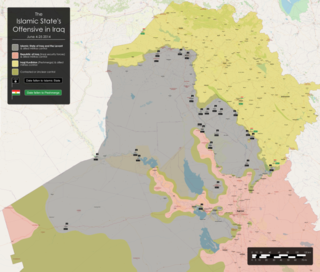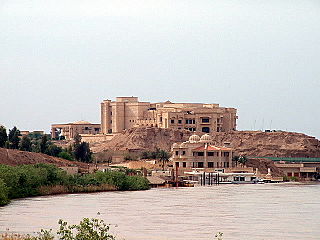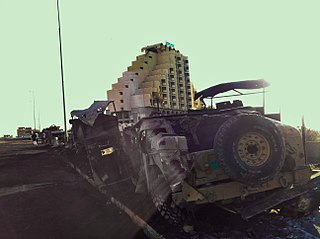
Basra Governorate, also called Basra Province, is a governorate in southern Iraq in the region of Arabian Peninsula, bordering Kuwait to the south and Iran to the east. The capital is the city of Basra, located in the Basrah district. Other districts of Basra include Al-Qurna, Al-Zubair, Al-Midaina, Shatt Al-Arab, Abu Al-Khaseeb and Al-Faw located on the Persian Gulf. It is the only governorate with a coastline.

The Northern War of 1655–1660, also known as the Second Northern War, First Northern War or Little Northern War, was fought between Sweden and its adversaries the Polish–Lithuanian Commonwealth (1655–60), the Tsardom of Russia (1656–58), Brandenburg-Prussia (1657–60), the Habsburg monarchy (1657–60) and Denmark–Norway. The Dutch Republic waged an informal trade war against Sweden and seized the colony of New Sweden in 1655, but was not a recognized part of the Polish–Danish alliance.

The First Battle of Fallujah, code-named Operation Vigilant Resolve, was an operation against militants in Fallujah as well as an attempt to apprehend or kill the perpetrators of the killing of four U.S. contractors in March 2004.

After the 2003 invasion of Iraq was completed and the regime of Saddam Hussein was toppled in May 2003, an Iraqi insurgency began that would last until the United States left in 2011. The 2003–2006 phase of the Iraqi insurgency lasted until early 2006, when it escalated from an insurgency to a Sunni-Shia civil war, which became the most violent phase of the Iraq War.
Dancon/Irak was a Danish ground contingent deployed to Iraq from June 2003 to July 2007, during the Iraq War.
Al-Qa'im is an Iraqi border town located nearly 400 km (248 mi) northwest of Baghdad near the Syrian border and situated along the Euphrates River, and located in the Al Anbar Governorate. It has a population of about 74,100 and it's the center of the Al-Qa'im District.

The Multi-National Force – Iraq (MNF–I), often referred to as the Coalition forces, was a U.S.-led military command during the Iraq War from 2004 to 2009.

The Second Battle of Ramadi was fought during the Iraq War from March 2006 to November 2006, for control of the capital of the Al Anbar Governorate in western Iraq. A joint US military force under the command 1st Brigade Combat Team, 1st Armored Division and Iraqi Security Forces fought insurgents for control of key locations in Ramadi. Coalition strategy relied on establishing a number of patrol bases called Combat Operation Posts throughout the city.

The Battle of Mosul was fought during the Iraq War in 2004 for the capital of the Ninawa Governorate in northern Iraq that occurred concurrently to fighting in Fallujah.

The 2004 Iraq spring fighting was a series of operational offensives and various major engagements during the Iraq War. It was a turning point in the war; the Spring Fighting marked the entrance into the conflict of militias and religiously based militant Iraqi groups, such as the Shi'a Mahdi Army.

The Battle of Qurna, was between British forces and Ottoman forces that had retreated from Basra, which they lost at the Battle of Basra (1914) during the Mesopotamian campaign of World War I.

The Battle of Haifa Street was fought during January 2007 for the control of Haifa Street, a two-mile-long street in downtown Baghdad, Iraq, pitting American and Iraqi Army forces against various Sunni insurgent forces between January 6 and January 9, 2007, and then two weeks later on January 24 when US forces launched a second attempt to clear Haifa Street of insurgents once and for all. This battle was the precursor for clearing operations that would set the conditions for "the surge" which ultimately neutralized insurgent groups in this part of Baghdad during the spring and summer of 2007.

The Diyala province campaign was a series of operations conducted by coalition forces against Iraqi insurgents and a number of bombing and guerrilla attacks against the security forces in Diyala Governorate of Iraq, with the purpose of control of the province.

The Battle ofSulaymaniyah was one of the greatest battles fought during the 1991 uprisings in Iraq. Sulaymaniyah, a mostly Kurdish city with a population of over 100,000, was the first to be liberated by the rebels and the last to fall back to the Iraqi army. The city was then recaptured by Kurdish rebels, after the Peshmerga launched a new offensive on 20 July.
The Battle of the Palm Grove took place during the Iraq War when elements of the Second Advise and Assist Brigade, 25th ID of the US Army and 512th Military Police Company US Army supported 200 Iraqi Army and Iraqi Police in a search and sweep operation against 15-25 insurgents planting IEDs in Hudaidy, Diyala Province.

The Northern Iraq offensive began on 4 June 2014, when the Islamic State of Iraq and Levant, assisted by various insurgent groups in the region, began a major offensive from its territory in Syria into Iraq against Iraqi and Kurdish forces, following earlier clashes that had begun in December 2013 involving guerillas.

The First Battle of Tikrit was fought for the Iraqi city of Tikrit following the city's capture by the Islamic State and Ba'athist Loyalists during the 2014 Northern Iraq offensive. The battle took place between 26 and 30 June 2014.
The fall of Fallujah was a battle in the city of Fallujah in western Iraq that took place from late 2013 to early 2014, in which Islamic State (IS) and other Sunni insurgents captured the city of Fallujah. It was one of the first Iraqi cities to fall out of the control of the Iraqi Government, and resulted in the Anbar campaign.

The fall of Mosul in Iraq occurred between 4 and 10 June 2014, when Islamic State (IS) insurgents, initially led by Abu Abdulrahman al-Bilawi, captured Mosul from the Iraqi Army, led by Lieutenant General Mahdi Al-Gharrawi.

The Iraqi conflict is a series of violent events that began with the 2003 American-led invasion of Iraq and deposition of Iraqi president Saddam Hussein, followed by the War in Iraq, an armed conflict between Iraq and its allies and the Islamic State. The most recent conflict is the ongoing Islamic State insurgency,















